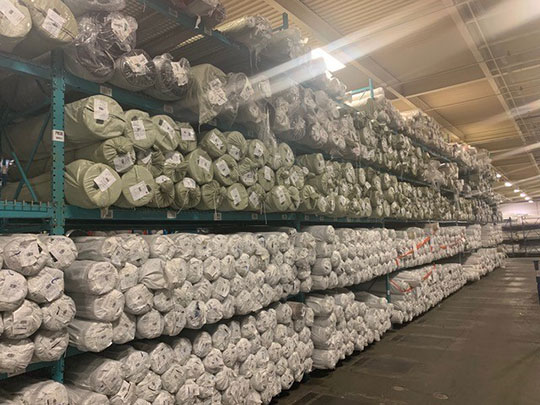This comprehensive exploration delves into the inner workings of textiles factory operations, uncovering the intricate processes, technologies, and labor dynamics that underpin the efficient and quality-driven production of a diverse range of textile products. From the weaving of intricate fabrics to the intricacies of supply chain management, this study offers valuable insights into the multifaceted dynamics of textiles factory operations and their pivotal role in driving the global textile manufacturing industry.
Introduction
As key players in the global textile manufacturing industry, textiles factories play an indispensable role in the creation of an extensive array of fabrics and materials that define contemporary fashion and lifestyle. From the intricate art of weaving to the precise science of dyeing and finishing, textiles factories serve as hubs of innovation, efficiency, and craftsmanship, driving the production of high-quality textiles that meet the diverse and evolving demands of a global market. This exploration peels back the layers of textiles factory operations, unveiling their essential role in shaping the very fabric of the textile industry.
Unveiling the Essential Role of Textiles Factories in the Global Textile Manufacturing Industry
The essential role of textiles factories in the global textile manufacturing industry extends far beyond the realms of production; it encompasses a commitment to precision, innovation, and operational excellence that defines the very essence of textile craftsmanship. From the sourcing of raw materials to the meticulous weaving, dyeing, and finishing processes, textiles factories serve as the epicenter of creative ingenuity and technological advancements that drive the industry forward. Unveiling their pivotal role offers valuable insights into the intricate dynamics that underpin the global textile manufacturing landscape, highlighting the dedication and expertise embedded within every thread of fabric that emerges from their looms.
Manufacturing Processes in Textiles Factories
Understanding the Intricacies of Weaving, Dyeing, and Finishing in Textiles Production
Within the confines of textiles factories, a symphony of manufacturing processes orchestrates the transformation of raw materials into exquisite textiles that adorn the fashion runways and homes across the globe. Understanding the intricacies of these processes, from the rhythmic interlacing of threads during weaving to the precise application of dyes and the meticulous finishing touches, is crucial for comprehending the craftsmanship and attention to detail that define the quality of textiles produced. Each step in the manufacturing process demands a delicate balance of artistry and precision, reflecting the culmination of centuries-old techniques and state-of-the-art technologies that shape the diverse and enchanting tapestry of textiles factory operations.
Advanced Technologies in Textiles Factory Operations
In an era characterized by rapid technological advancements, textiles factories are at the forefront of embracing cutting-edge technologies and automated machinery that revolutionize the production processes and elevate the efficiency and precision of textile manufacturing. By integrating state-of-the-art equipment and digital solutions, textiles factories not only streamline their operations but also enhance product quality and accelerate the pace of production, positioning themselves as pioneers in the global textiles manufacturing landscape.
Exploring the Integration of Automation and Cutting-edge Machinery in Textiles Manufacturing
The integration of automation and cutting-edge machinery in textiles manufacturing marks a paradigm shift in the way textiles factories operate, enabling them to achieve unprecedented levels of operational efficiency and product consistency. From automated looms and robotic dyeing systems to computer-controlled quality control mechanisms, these technological innovations streamline the production workflow, minimize human error, and optimize resource utilization, thereby empowering textiles factories to meet the demands of a competitive and rapidly evolving market. Exploring the integration of such advanced technologies sheds light on the transformative impact they have on textiles factory operations, fostering a culture of innovation, precision, and sustainable growth within the industry.
Labor Dynamics and Skill Development in Textiles Factories
Analyzing the Role of Skilled Labor and Training Programs in Maintaining Efficient Operations
Behind every efficient textiles factory operation lies a skilled workforce whose expertise and dedication form the backbone of the industry. The role of skilled labor and comprehensive training programs in textiles factories is paramount, as it ensures that the intricate processes involved in textile manufacturing are executed with precision and finesse. By investing in skill development initiatives, apprenticeship programs, and continuous training, textiles factories cultivate a workforce that is not only well-versed in traditional techniques but also adaptable to the demands of modern manufacturing technologies. Analyzing the pivotal role of skilled labor underscores the human element embedded within textiles factory operations, emphasizing the industry’s commitment to nurturing talent and fostering a culture of excellence and continuous improvement.
Supply Chain Management in Textiles Factory Operations
The seamless management of supply chains is integral to the success and efficiency of textiles factory operations, ensuring the timely sourcing of raw materials, the effective management of inventories, and the efficient distribution of finished products to domestic and international markets. By navigating the intricacies of supply chain management, textiles factories optimize their production processes, minimize operational costs, and uphold their commitment to delivering high-quality textiles that meet the diverse and evolving demands of global consumers.
Navigating the Complexities of Sourcing, Inventory Management, and Distribution in Textiles Manufacturing
Navigating the complexities of sourcing, inventory management, and distribution in textiles manufacturing requires a strategic approach that accounts for market fluctuations, regulatory compliance, and logistical challenges. From establishing reliable partnerships with raw material suppliers to implementing robust inventory management systems and leveraging efficient distribution networks, textiles factories ensure the seamless flow of materials and products across various stages of the supply chain. By fostering transparency, resilience, and adaptability, textiles factories can navigate the complexities of supply chain management and position themselves as agile and responsive players in the competitive global textiles manufacturing landscape.
Quality Control and Assurance in Textiles Factory Operations
Upholding Stringent Quality Standards and Protocols to Ensure Product Excellence and Customer Satisfaction
Upholding stringent quality standards and protocols is paramount in textiles factory operations, as it ensures that every fabric that leaves the production line meets the highest benchmarks of excellence and customer satisfaction. From rigorous product inspections and standardized quality control measures to compliance with industry regulations and ethical manufacturing practices, textiles factories demonstrate an unwavering commitment to delivering textiles that are not only aesthetically appealing but also durable, safe, and environmentally sustainable. By prioritizing quality control and assurance, textiles factories instill confidence in their customers, foster brand loyalty, and establish themselves as beacons of reliability and integrity within the textiles manufacturing industry.




